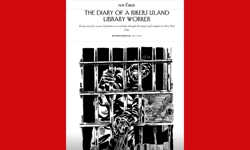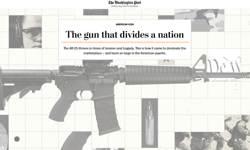Never have there been more issues to explore about the media - everything from phone tapping and super-injunctions to what is the very nature of a journalist in the digital era and on to issues such as the survival of the press in printed form after four centuries.
Then there is the small matter of the future of the BBC, whether Rupert Murdoch should be able to take over all of BSkyB and how never-ending waves of social media and digital leaks are in some cases, particularly in the Middle East, helping to shake societies to their core.
The Media Page
And yet the specialist media pages that would have devoted so much comment and analysis to those very issues have all but melted away after a 20-year existence that began in May 1984 when, at very short notice, the Guardian editor Peter Preston decided to launch The Media Page to go alongside the existing education and society pages.
In those days, it was indeed only a single page but it is believed to have been the first such page devoted to the affairs of the media in the world.
Soon, every self-respecting newspaper had to have their own media section and, for a while at least, the role of media editor was a position guaranteed to bestow a high profile, though it also often came with difficult dilemmas and internal pressures.
Some saw the rise of the media pages as little more than self-indulgent navel-gazing and anyway wasn’t it impossible to be completely honest so publicly about the organisation you actually worked for?
There was indeed always the danger of being soft with your own publication’s “house” stories while going along with many owners’ natural interest in seeing the dirt dished on their rivals.
One of the leading media editors of her day, Maggie Brown, who was media editor of both the Guardian and the Independent, believes the navel-gazing jibe was never true and that the media sections covered real stories – many of them about the business of the media - with as much professionalism as any other form of specialist journalism.
“The Guardian had the G2 (sections) media, education, society and technology and for probably twenty years, they had a very lucrative stream of income,” recalls Brown.
“It was also editorially driven because there were all those stories and debates about the BBC and the launch of Sky. They were huge stories and the sneering and navel-gazing allegations simply won’t wash,” adds Brown.
The world’s first media editor, Peter Fiddick of the Guardian, for example, insisted from the outset that the ABC circulation figures would always be carried in the paper – even if the figures didn’t look too hot for the Guardian itself. And it was usually possible to cover the affairs of one’s own title in a straightforward factual way.
“Journalists have always been interested in their own bit of the communications business and their ability to cover it in the way they cover everything else is something that journalists are not going to let go of in a hurry,” says Fiddick.
Fearless of the FT
Certainly it can be stated from personal experience that it was possible to cover the affairs of Pearson, owners of the Financial Times, with complete honesty.
Pearson knew instinctively that the value of the FT was intimately connected to the impartiality and accuracy of the information in the pink pages and that included what was written about the owning company.
So it was once possible to pick up and develop a tip that Pearson was planning to buy Thames Television after the broadcaster lost its ITV licence.
When the story was put to Lord Blakenham, the then Pearson chairman, he said “ask Frank Barlow”, the chief executive.
Barlow, now Sir Frank, replied: “No comment”.
And so the story went onto the front page of the next morning’s FT.
Later when the deal was complete, Lord Blakenham said the FT story had cost Pearson several million pounds - because the terms of the deal were linked to the Thames share price which rose when the talks leaked.
It was also possible for one of his own reporters to doorstep the then editor of the FT Richard Lambert and ask for his comment on the fact that the FT’s NUJ chapel had just passed a vote of no confidence in him.
But given the scale of the huge stories now affecting the future of the media, why has the specialist media section become such an endangered species?
The Guardian which was first into the field is now the last section standing except for the recent introduction of a single page in Monday’s edition of i, the Independent’s attempt to develop a new title in the market.
“I think the Guardian was the only one to make it (media sections) a commercial proposition. Maybe the Independent briefly but it was not a core proposition,” says Dan Sabbagh, media and technology editor of the Guardian.
Moving online?
Speaking recently, Sabbagh said he could not guarantee the survival of the Guardian’s media section in print though he would do his best to preserve it because he does not believe long, thoughtful features work well online.
The longer term doubts over the print survival of the Guardian media section increased in June when the Guardian announced a £33 million cash loss for last year, circulation down more than 12 per cent year-on-year to 262,937 with the inevitably of redundancies to follow.
At the time, Guardian Media Group chief executive Andrew Miller warned of the need to downsize in print and become “digital-first” sooner than expected.
So the media pages have been hit by the worsening economics of newspapers, the resulting pressure on pagination and the move of classified advertising to the web.
The number of media-related blogs suggests there is no fall-off in interest among the public in how the media works and there is certainly no shortage of media stories. It’s just that many of them have migrated either to the web and online services such as MediaGuardian or into the main news sections of the paper.
Proprietorial sensibilities
In a way, the fact that media stories have escaped from the reservation and become part of the more legitimate news mainstream is a mark of maturity rather than decline.
Changes in ownership and the structure of the media may also have played a part. Some owners are more tolerant than others and some editors are more interested in covering the subject than others.
For all his current legal difficulties, Lord Black, the former chairman of the Daily Telegraph, had a relatively light touch as a proprietor. The current owners of the Daily Telegraph, the Barclay brothers, hate being written about, and have been known to issue writs in the past.
The tentacles of Rupert Murdoch’s empire are now so vast internationally and touch so many issues concerning the media, some very controversially, that many believe the appetite of the Times for media stories seems less than before.
The paper’s media section has long since gone and the Times has no media editor at the moment, which seems odd given that the paper’s editor, James Harding, made his name as media editor of the Financial Times.
The Independent tried to take on the Guardian and launched a 24-page media section on Mondays in 2004 but when the hoped for advertising failed to materialise, it was down-graded and then disappeared in the re-design that produced the Viewspaper.
There was a brief flowering of the species at the FT with the launching of Creative Business in 2000 but by 2004 it had become a monthly and then disappeared.
Founding editor Andy Davis says Creative Business was driven by all the excitement over new media and new business models.
“It was an example of what you see a lot - by the time the media start writing about something. It’s over. The ad model was basically classified and that was owned by the Guardian,” says Davis.
As for Sabbagh, he says specialist media coverage is in the DNA of his paper.
“Our only competitor is the FT which is passionately interested in business in all forms but not much else,” he says.
Does it matter?
Has anything serious been lost journalistically by the near death experience of the media pages given that there is no shortage of coverage of stories such as the phone-tapping scandal at the News of the World?
The answer is yes.
The luxury of reserved space once a week allows the commissioning of more thoughtful pieces that pick up on coming trends or try to tell us something of the future – the sort of indicative stories that would not exactly excite news desks.
Try to tell a news editor that you would like to write 1,500 words asking whether the BBC was becoming more cautious in its news judgements because of a growing compliance culture following the Hutton inquiry.
Yet Maggie Brown was able to write such a piece for the Guardian precisely because there was space in the media pages and the issue has been raised by the BBC Trust.
It is however unlikely that the missing media pages will ever return in their old form but at least there is Private Eye to help keep journalism honest. And the broadcasters have also taken up some of the slack with the Media Show and Feedback on Radio 4 and Newswatch on BBC Television.
(This article is based on a contribution to the British Journalism Review.)










